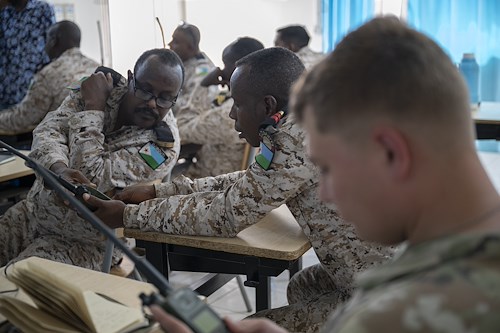Senior leaders from Combined Joint Task Force-Horn of Africa hosted a delegation of professional working media representatives from the countries of Morocco and Tunisia via video-teleconference June 10.
The media delegation event with CJTF-HOA was part of a week-long visit to Headquarters, U.S. Africa Command, for the group of 13 journalists.
The CJTF-HOA leaders discussed the CJTF’s mission during a command briefing and wide-ranging question and answer session with the journalists. U.S. Air Force Col. James R. Kriesel, CJTF-HOA Chief of Staff, led the discussion.
Topics included conflicts along some borders in CJTF-HOA’s East Africa area of operations; the existing implementation agreement between Djibouti and the CJTF; the strategic positioning of CJTF-HOA’s headquarters at Camp Lemonnier; collaborative efforts between the CJTF and other nations with a military presence on the African continent, like France, Japan, Germany, Spain, South Korea and Italy; the various aspects of CJTF-HOA’s mission including the battle against Violent Extremist Organizations (VEOs); and the importance of HOA’s relationships and collaboration with its East African partners.
Kriesel praised the positive relationship with the host nation, Djibouti, saying the Government of Djibouti has welcomed the coalition and highlighting the recently signed implementation agreement between Djibouti and CJTH-HOA, a partnership lease that allows the coalition to remain in Djibouti for 20 years with an additional 10-year option.
“We receive tremendous support from the Djiboutian Government and enjoy a terrific relationship with our host nation,” Kriesel said.
The media delegation also asked how the coalition deals with and handles legal requirements with the host nation and other East African partners.
“We make great efforts to work with our East African partners, collaborating on agreements that protect our collective interests in the region,” said U.S. Navy Capt. Charles, T. Passaglia, CJTF-HOA Judge Advocate General. Passaglia highlighted examples of this collaboration, including the establishment of a Status of Forces Agreement, logistics agreements for goods-and-services payment and reimbursement in kind, and working with each individual nation to respect its territorial sovereignty regarding permission to transit or overfly its land.
Additionally, strategic location of Djibouti and, by extension, the coalition headquarters on Camp Lemonnier were a topic of discussion, and HOA leaders highlighted its presence in one of the worlds’ major shipping locations as the port of Djibouti is positioned near to or among the Gulf of Aden, the Red Sea and the Suez Canal.
Beyond the strategic location of Djibouti and the coalition headquarters, there was much discussion about the CJTF’s mission and lines of effort, which include: neutralizing VEOs; working together with East African partners to shape the environment; working together with East African partners to enable partners; and working together with East African partners to ready the force.
“We continue to work closely with our valued East African partners across these fronts,” Kriesel said. “This is not always easy – it takes time and it is hard, but we are extremely encouraged by our continuing progress in working together, multi-laterally, to increase partner capacity and capability.
“We are making progress.”
Citing specific examples of this progress, Kriesel highlighted the work of coalition U.S. Army civil affairs teams with various civil engagements, enabling partner nation populations to increase economic vitality; work in schools and with hospitals and medical facilities as well as veterinary outreach to improve education, public health and livestock vitality; the commitment CJTF-HOA has to its East African partners for crisis response; a variety of successful military-to-military training engagements across the region and its 10 East African nations; and key leader engagements between CTJF-HOA Commander, U.S. Army Maj. Gen. Mark R. Stammer, and his counterparts at the highest levels of civilian and military leadership in each partner nation as well as engagements at all levels below CJTF-HOA, the 10 regional U.S. Embassies and the leadership and governments of the 10 East African partner nations.
On that last point, Kriesel also noted the complexity of the coalition’s operating environment.
“We are led by our Embassies (from each East African partner nation, we receive our guidance from AFRICOM, and we get our policy, budget and authorities from Washington (D.C.), so it’s an extremely complex and often challenging environment and we must have strategic agility to succeed,” Kriesel said.
Equally complex is dealing with the variety of regional threats, including the presence of a number of VEOs, including Al Shabaab, ISIS, Boko Haram and Al Qaeda.
The CJTF’s Director of Operations, U.S. Navy Capt. Bradley D. Holt, summarized what it will take for CJTF-HOA and its East African partners to counter and neutralize these threats to regional instability.
“These threats span national borders in East Africa so we can’t deal with one, two or three countries individually – we must deal with the threats, together, in a multi-lateral effort,” Holt said. “This requires a regional approach.”
Kriesel added to Holt’s premise: “The CJTF is here to support, enable and learn from our East African partners and get to what their solutions – not ours – to East African problems and challenges are.”
“East Africans solving East African challenges.”




